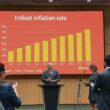US President Donald Trump has once again publicly criticized the head of the Federal Reserve, Jerome Powell, demanding an immediate interest rate cut. In contrast to the European Central Bank, the US Federal Reserve has not further reduced interest rates in recent times; the last reduction was in September 2024 and the benchmark interest rate currently stands at 4.25 percent, which is two percent higher than the rate of the ECB since the last reduction in Frankfurt.
Trump made the accusation on his social media platform, Truth Social, calling Powell “Mr. Too Late” and threatening to fire him. The Fed, like the ECB, is not a state-owned bank but was established in December 1913 by major Wall Street banks. Since the financial crisis of 2008, it has, among other things, supported stock prices by buying large quantities of stocks.
The reaction from abroad to Trump’s attacks on Powell was extremely critical. The French Finance Minister, Eric Lombard, warned that Trump would jeopardize the credibility of the US dollar and destabilize the US economy if he fired Powell. In recent times, not only China but also Japan have sold more US government bonds, which puts pressure on US government bonds and threatens the stability of the US government budget.
The reaction of the stock markets to this conflict was clear: the US dollar and US government bonds fell in value. The two most important indices of the US stock exchanges, the Dow Jones and the Standard & Poor’s, fell by more than two percent. At the same time, gold and the Bitcoin continued to rise. The euro also rose against the dollar.
Last week, a first US senator called for the Congress to investigate whether insider trading had occurred in the environment of Donald Trump. Trump had publicly called for people to buy stocks before the previously sharply falling prices rebounded after his last shift in tariff policy.





